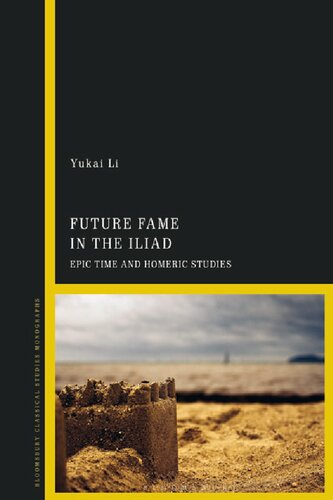Product desciption
Future Fame In The Iliad Epic Time And Homeric Studies Yukai Li by Yukai Li 9781350239197, 9781350239234, 1350239194, 1350239232 instant download after payment.
When Homeric heroes think about the meaning of their actions, they expect this to take the form of kleos, ‘fame’, in a future song. This volume explores the consequences of this mode of thinking in the Iliad in particular, and argues that the form of kleos and the interposition of a gap of time between event and meaning produces widespread effects, not only for the thought and psyche of the heroes, but also for the nature of poetry and Homeric scholarship.
Is epic time continuous, perpetuating the fame of the heroes in the flow of poetic tradition, or does a gap intervene to put into doubt the self-identity of meaning and the possibility of memory? This question connects the poetic logic of fame for the heroes and singers of epic to the implicit temporalities of Homeric studies. Alongside the analysis of literary figures from the Iliad, such as narrative, objects and similes, this volume reads modern scholarship on Homer – including oral theory, neoanalysis and traditional referentiality – as forms of reception which have produced distinct responses to the temporality of ancient epic. The participants in epic kleos – heroes, poets and scholars – encounter each other through a tradition that joins the memories and presentiments of a past that did not happen and futures that will never arrive.
This study connects the Iliad and its modern scholarship through the different images of time expressed in them. When the Homeric heroes think about the meaning of their actions, they expect it to come in the form of kleos, ‘fame’, in a future song. What are the consequences of this form of thinking that interposes a gap of time between event and meaning? In the Iliad, there results a temporal structure in which the present moment is divided between the provisional meaning existing in the now and an unknown, revised meaning that may come in the future. For Homeric scholarship, the divided form of time differentiates approaches which rely on continuity of meaning from those which, like the Iliad, presuppose an essential break in meaning and the failure of memory. When applied to the major schools of Homeric scholarship in oral theory and neoanalysis, the question of time allows us not only to distinguish the broad reliance of the former on continuity and the latter on interruption, but also follow the nuances and contradictions internal to each. The divided image of time connects poetic figures in the Iliad, from the rhetoric of the heroes and the logic of similes to the meaning of objecthood and the fixity of fate. At the end of the study, we answer the question of why the divided image of time of the Iliad is necessary by reconstructing the temporalities of Homeric poetry and scholarship within the framework of Deleuze’s philosophy of time.


